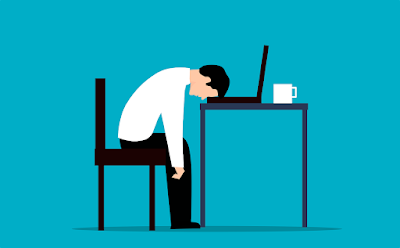The habit of scheduling sleep
- Get link
- X
- Other Apps
Sleep scheduling refers to the practice of planning and maintaining a consistent sleep schedule in order to promote healthy sleep patterns. This can include setting a regular bedtime and wake-up time, as well as developing good sleep hygiene habits such as avoiding stimulating activities before bed and creating a comfortable sleep environment.
One important aspect of sleep scheduling is understanding the body's natural sleep-wake cycle, also known as the circadian rhythm. This internal biological clock regulates the timing of many physiological processes, including the release of hormones and the onset of sleepiness. The circadian rhythm is influenced by exposure to light, with bright light during the day helping to keep us awake and alert, and darkness at night promoting sleepiness.
Maintaining a consistent sleep schedule helps align our internal clock with the external environment, making it easier for our body to fall asleep and wake up at the desired times. This can also help improve the quality of sleep, as the body is better able to enter and maintain the different stages of sleep, including deep sleep and REM sleep.
Adults typically need 7-9 hours of sleep per night, and sticking to a consistent sleep schedule can help ensure that we get the recommended amount of sleep. However, it's also important to note that sleep needs can vary from person to person, and it's important to listen to your own body's signals to determine the right amount of sleep for you.
One of the most effective ways to establish a sleep schedule is to go to bed and wake up at the same time every day, even on weekends and holidays. This will help regulate your body's internal clock and make it easier to fall asleep and wake up at the desired times.
Another important aspect of sleep scheduling is developing good sleep hygiene habits. This can include avoiding stimulating activities, such as watching TV, using the computer, or playing video games, in the hour leading up to bedtime, as well as avoiding caffeine and nicotine later in the day. It can also include creating a comfortable sleep environment, such as keeping the bedroom dark, quiet, and cool, and using comfortable bedding.
It's also worth noting that certain medical conditions and medications can affect sleep patterns, and it's important to consult with a healthcare professional if you're experiencing sleep problems.
Overall, sleep scheduling is an important aspect of maintaining healthy sleep patterns. By setting a regular bedtime and wake-up time, developing good sleep hygiene habits, and aligning our internal clock with the external environment, we can improve the quality of our sleep and ensure that we get the recommended amount of sleep.
How many hours should adults sleep on average?
On average, adults should aim to get between 7-9 hours of sleep per night. However, it's important to note that individual sleep needs can vary and that some people may need more or less sleep depending on factors such as age, lifestyle, and overall health.
The National Sleep Foundation (NSF) recommends the following sleep durations for different age groups:
- Newborns (0-3 months): 14-17 hours
- Infants (4-11 months): 12-15 hours
- Toddlers (1-2 years): 11-14 hours
- Preschoolers (3-5 years): 10-13 hours
- School-age children (6-13 years): 9-11 hours
- Teenagers (14-17 years): 8-10 hours
- Adults (18-64 years): 7-9 hours
- Older adults (65+ years): 7-8 hours
It's important to note that these are just guidelines and that individuals should listen to their own body's signals to determine the right amount of sleep for them. If you're consistently feeling tired during the day, or if you're experiencing symptoms such as irritability, mood swings, or difficulty concentrating, you may need to increase the amount of sleep you're getting.
It's also worth noting that certain medical conditions and medications can affect sleep patterns, and it's important to consult with a healthcare professional if you're experiencing sleep problems.
The recommended amount of sleep for adults is between 7-9 hours per night. However, individual sleep needs can vary and it's important to listen to your own body's signals to determine the right amount of sleep for you.
Is there a known correlation between sleep and happiness?
There is a strong correlation between good sleep and happiness. Sleep plays a crucial role in regulating our mood, emotions, and overall well-being. When we don't get enough or poor quality sleep, it can lead to feelings of irritability, mood swings, and a lack of motivation, which can negatively impact our overall happiness.
Research has shown that people who get enough and good quality sleep tend to have a more positive outlook on life, experience less stress and anxiety, and have better overall mental health. They also tend to be more productive, have better cognitive function, and are less likely to experience depression and other mental health disorders.
One of the main reasons for the correlation between good sleep and happiness is that sleep plays a crucial role in regulating the release of hormones such as serotonin and dopamine, which are responsible for regulating our mood and emotions. When we don't get enough or poor quality sleep, it can disrupt the balance of these hormones, leading to feelings of depression and anxiety.
Additionally, research has also shown that people who have a consistent sleep schedule tend to have better overall sleep quality and are less likely to experience insomnia and other sleep disorders. By maintaining a consistent sleep schedule, people are able to regulate their body's internal clock and fall asleep and wake up at the desired times, making it easier for their body to enter and maintain the different stages of sleep, including deep sleep and REM sleep. This can lead to better overall sleep quality, which in turn leads to better mood and overall well-being.
It's also worth noting that good sleep hygiene practices, such as avoiding stimulating activities before bed, creating a comfortable sleep environment, and avoiding caffeine and nicotine later in the day, can also play a crucial role in promoting good sleep and happiness.
There is a strong correlation between good sleep and happiness. Good sleep plays a crucial role in regulating our mood, emotions, and overall well-being. When we don't get enough or poor quality sleep, it can lead to feelings of irritability, mood swings, and a lack of motivation, which can negatively impact our overall happiness. By maintaining a consistent sleep schedule and developing good sleep hygiene habits, we can promote good sleep, which in turn leads to better overall mood and well-being.
Are day sleeping habits as important as night sleeping?
While night-time sleep is crucial for overall health and well-being, daytime napping can also have significant benefits. Daytime napping can help improve mood, increase alertness and productivity, and boost memory and cognitive function.
One of the main benefits of daytime napping is that it can help combat fatigue and improve alertness. A short nap of 20-30 minutes can help reduce feelings of grogginess and improve cognitive performance. This is especially helpful for individuals who may not be getting enough sleep at night, or for those who have physically or mentally demanding jobs.
Daytime napping can also have a positive impact on mood. Research has shown that napping can reduce feelings of stress and anxiety, and can improve overall mood. This is likely due to the release of neurotransmitters during sleep that are known to have a calming effect.
In addition to the immediate benefits of napping, regular daytime napping can also have long-term benefits for memory and cognitive function. Studies have shown that napping can improve memory consolidation, which is the process of strengthening and stabilizing new memories. This is particularly important for older adults, as memory function can decline with age.
However, it is important to note that not all naps are created equal, and certain napping habits can be detrimental to sleep quality. For example, taking a nap too late in the day can disrupt nighttime sleep, and napping for too long can lead to feelings of grogginess upon waking.
It is also important to recognize that napping is not a substitute for a good night's sleep. While napping can provide some benefits, it is not a replacement for the restorative processes that occur during nighttime sleep. Therefore, it is essential to maintain good sleep habits and get enough nighttime sleep to ensure overall health and well-being.
While nighttime sleep is essential for overall health and well-being, daytime napping can also have significant benefits. Regular, short naps can improve mood, alertness and productivity, and boost memory and cognitive function. However, it is important to maintain good sleep habits and to ensure that napping is not disrupting nighttime sleep.
Is napping advisable for students?
Napping can be an effective way for students to improve their focus and cognitive function, but it's important to consider the timing, duration, and frequency of napping to ensure that it does not interfere with nighttime sleep.
One of the main benefits of napping for students is that it can help improve cognitive performance. A short nap of 20-30 minutes can help reduce feelings of grogginess, increase alertness and focus, and boost memory and cognitive function. This can be especially beneficial for students who may be struggling to stay awake during class or while studying.
Napping can also help reduce stress and improve mood, which can be beneficial for students who are dealing with a heavy workload or high levels of stress. Additionally, regular napping can help improve memory consolidation, which is the process of strengthening and stabilizing new memories.
However, it is important to note that not all naps are created equal, and certain napping habits can be detrimental to sleep quality. For example, taking a nap too late in the day can disrupt nighttime sleep, and napping for too long can lead to feelings of grogginess upon waking. It's also important to be aware of the timing of napping and to avoid napping close to bedtime as it may interfere with nighttime sleep.
Also, it is important for students to consider their individual needs and schedule when deciding whether or not to nap. For example, some students may find that napping in the afternoon helps them stay alert and focused during evening study sessions, while others may find that napping interferes with their nighttime sleep and should be avoided.
Napping can be an effective way for students to improve their focus and cognitive function, but it's important to consider the timing, duration, and frequency of napping to ensure that it does not interfere with nighttime sleep. It's also important for students to consider their individual needs and schedule when deciding whether or not to nap. Regular short naps can improve cognitive performance, reduce stress, and improve mood and memory consolidation, but it is important to be mindful of the timing and not to nap too close to bedtime.
What foods are known to improve sleep?
There are several foods that are known to improve sleep. Some of the most notable include:
Cherries: These are a natural source of melatonin, a hormone that helps regulate the sleep-wake cycle. Eating a small portion of cherries before bed can help promote a more restful night's sleep.
Milk and dairy products: Milk and dairy products such as yogurt and cheese are rich in calcium, which has been shown to promote sleep. Calcium is necessary for the production of melatonin, the hormone that regulates sleep.
Bananas: Bananas are a good source of potassium and magnesium, two minerals that help the muscles relax and promote a more restful sleep. They are also rich in vitamin B6 which is needed for melatonin production.
Fish: Fish, particularly salmon and tuna, are high in omega-3 fatty acids, which have been shown to improve sleep. These essential fatty acids also have anti-inflammatory properties that can help reduce pain and discomfort, which can make it easier to fall asleep.
Tryptophan-rich foods: Tryptophan is an amino acid that the body uses to make serotonin, a neurotransmitter that helps regulate sleep. Foods that are rich in tryptophan include turkey, eggs, cheese, and nuts.
Whole grains: Whole grains such as oatmeal, quinoa, and brown rice contain complex carbohydrates which can help promote sleep by increasing the production of serotonin.
Herbs and spices: Certain herbs and spices such as chamomile, valerian root, passionflower, and lavender have been used for centuries to promote sleep. They have been found to have a calming effect on the body and mind, which can help reduce insomnia and improve sleep quality.
It's important to note that consuming large amounts of these foods close to bedtime may have negative effects on sleep. Also, it's important to consider any food allergies or intolerances before consuming these foods. It's always advisable to consult with a healthcare professional before making any dietary changes.
Foods such as cherries, milk and dairy products, bananas, fish, tryptophan-rich foods, whole grains, and herbs and spices can help improve sleep. However, it's important to be mindful of the timing of when these foods are consumed and to consider any food allergies or intolerances before consuming them. It's always advisable to consult with a healthcare professional before making any dietary changes.
- Get link
- X
- Other Apps



